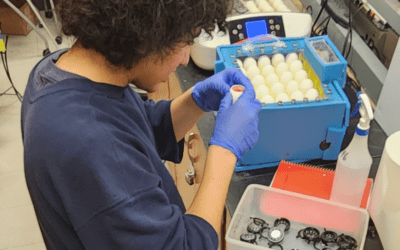
Jadyn Clinkscale’s class at Atlantic County Institute of Technology was brimming with conversation Monday as she and her peers prepared a presentation on plasma.
Clinkscale, a junior at the Mays Landing-based vocational school, and about 20 students were separated into groups tasked with giving lectures about the subjects in blood research.
Beside them, a row of medical science textbooks was organized on a row of shelves with supplies. Down the hall, dozens of other students were learning about dentistry, listening intently at their desks in front of a simulated exam room, fitted with two reclining chairs common to a dentist’s office.
The students are among the first to learn in classrooms inside the technical school’s new three-story building. The facility is a $53 million expansion for Atlantic County Institute of Technology, which continues to see a growing demand in enrollment.
On the main floor and past a new cafeteria, there are learning spaces for culinary students. The second floor features classrooms for the medical-related programs, administrators said.

Classes will also make use of a mock medical procedure room, giving students the opportunity to do hands-on learning with mannequins as patients. It’s the first time a facility of its kind is being used by the school, school officials said.
Students at Atlantic County Institute of Technology said they are excited to use the new equipment.
“If I went to any other high school besides ACIT, I wouldn’t have access to the new mannequins that we’re going to have because those things are really only accessible to colleges,” Clinkscale said.
Construction began on the building in 2023 and opened to students three weeks ago, said Superintendent Philip Guenther and Principal Joseph Potaky.
Portions of the building are being used under a temporary certification of occupancy from Hamilton Township, Guenther said.
Much of the building remains unfinished concrete. Other sections feature glossy tile flooring and freshly painted classrooms.
School officials hoped the building would be fully operational by the start of the academic year. However, the site had construction delays due to supply chain issues and weather problems, Guenther said.

“Some of it’s been unfortunate things with sequencing and weather, and things of that nature,” Guenther said. “For example, the gym. That material has to sit in the gym for several weeks, if not months, to acclimate to the weather and moisture conditions in the building.”
Spanning about 130,000 square feet, the building is equipped with classrooms tailored to the high school’s culinary, dental, medical and health science programs, allowing students hands-on work through lab equipment and simulations.
The building also has space for three new programs: exercise science; aviation maintenance; and welding and advanced fabrication. The expansion also includes facilities for other programs, including auto body collision and diesel mechanics.
The construction used about $40 million in grants from the state’s Securing Our Children’s Future Bond Act. The $500 million law was signed by Gov. Phil Murphy after voters approved the funding for vocational schools and county colleges in a 2018 referendum.
The remaining balance for the Atlantic County Institute of Technology project was funded by the county.
Atlantic County Institute of Technology’s state grant was the largest of 17 projects awarded money during the first round of grants in 2021, according to the New Jersey Council of County Vocational-Technical Schools.
The expansion will allow Atlantic County Institute of Technology to admit more than 400 students per year, the council said.

Officials anticipate the building will be fully open by early November.
Underground spaces at the school will house athletic facilities used for exercise science courses, administrators said. Nearby, students enrolled in aviation and welding courses will have new labs.
The new programs were created based on economic studies of Atlantic County, which show the area will continue to need a workforce in aviation, exercise science and welding, Guenther said. He cited the William J. Hughes Technical Center, which is run by the Federal Aviation Administration and based in Egg Harbor Township, as an example of a site in need of skilled workers.
Tech schools across every county are getting more applications than there are seats, Potaky said.
“That’s why they’re expanding,” he said.
This article originally appeared Sept. 23, 2025 in NJ.com



